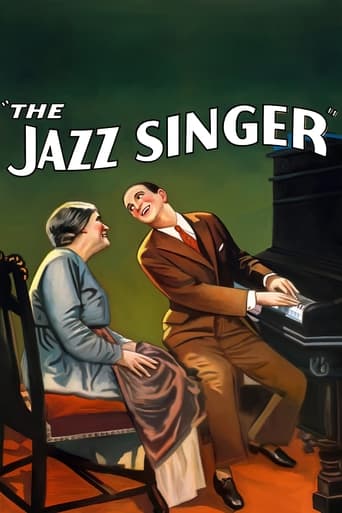Python Hyena
The Jazz Singer (1927): Dir: Alan Crosland / Cast: Al Jolson, May McAvoy, Warner Oland, Otto Lederer, Richard Tucker: First successful sound film with Al Jolson playing a successful jazz singer who fled home at a young age. His father is a Cantor who believes that his son is debasing the voice that God gave him but his mother is supportive. He soon meets a woman who claims that "there are lots of jazz singers but you have a tear in your voice." They get acquainted and tour New York. When his father becomes ill he wishes for his son to perform his duties at the church. This leads to predictable circumstances and a questionable performance by Jolson in blackface. Well directed by Alan Crosland with terrific musical numbers that distract us from the fact that the screenplay really isn't that interesting. Jolson gives an inspiring performance as a man seeking direction but his blackface appearance is offensive and best left on the cutting room floor. His female partner encourages his talent towards his own independence. His parents on the other hand, are as idiotic as the blackface performance. His father is a stereotype with a stick up his ass who pushes his views on his son. His mother isn't much broader. In supporting roles are May McAvoy, Warner Oland and Otto Lederer. Overrated formula driven story highlighted by Jolson's energy and sincere song and dance. Score: 5 / 10
disinterested_spectator
Once you strip away this movie's historical significance and musical numbers, you are left with some pretty heavy melodrama. Forced to choose between a long Jewish tradition from the old country and the individualism and freedom of America, Jakie chooses the latter, and is disowned by his father, a cantor from a long line of cantors who wants his son to be a cantor. This goes on through the whole movie and it wears you out. But then, on the opening night of his first big break in the theater, Jakie finds out his father is dying, and there is no one to sing in the temple on the Day of Atonement. He agonizes and agonizes over the choice he must make between family and career. But what was he worried about? Didn't he know this was a Hollywood movie where people get to have it both ways? He chooses to sing for his father, and then goes on to sing in the theater too, becoming a great success.
thermodon1
Seldom do I give a 10 star rating as few films are perfect, but this movie is as close to perfect as it could get for a silent film. The story line is sweet, the dubbed over original soundtrack is wonderful, making it interesting, and never left me wanting it to hurry up and end. Because this movie is available on Blu-ray, made it even better for having the quality it deserves. It certainly should be listed as a classic silent film in the top 100 of the genre. To rate this movie with just one word,"Fantastic", would be more than enough. It would be fair to say that this great early film is wonderful as the other top silent films of the age, such as the Big Parade, Wings, Sunrise, the Crowd and many, many others.
earlytalkie
The Jazz Singer is an important film historically since it was most definitely the film that brought the world into the sound era. Looked at today, many people hate the black face used by Al Jolson in the film but that was, like it or not, a very popular entertainment art form back in those days. Much has been said about the songs and ad-libs interpolated in the film, which was mostly silent with a synchronized music score. They are fine and channel the true Jolson. The film was given a very good restoration several years ago and it looks and sounds better than ever on the new DVD and Blu-Ray releases. The opening and exit music is present, and the DVD set I have is just about the most spectacular one ever released. Three discs with more extra features than I have ever see, and a cornucopia of printed materials originally released with the film in 1927. Listening to the cleaned-up musical score on the DVD, it sounds surprisingly modern, capturing the many moods of the various scenes. Yes, there are dated elements in this film, but they are overshadowed by the fact that this represents a cinematic watershed.

